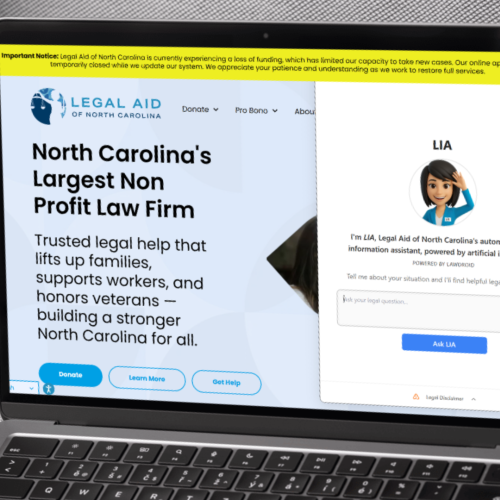LSC's Technology Initiative Grant (TIG) program awards special funding to existing LSC grantees to support creative and innovative uses of technology and enhance the grantee's technical capacity. TIG funding improves legal services delivery to the low-income population and increases access to high-quality legal services, the judicial system, and legal information.

Overview
Since 2000, when Congress first appropriated special funds for the Technology Initiative Grants program, LSC has been a leader in the development and use of technology to help meet the legal needs of low-income Americans.
TIG funding has provided current LSC grantees with a remarkable opportunity to explore new ways to serve eligible persons, to help build legal aid programs' capacities, and to support the efforts of pro bono attorneys. These projects use a broad range of technologies -- including mobile, cloud computing, data analysis, and automated document assembly -- to make the delivery of legal services in the United States more efficient and effective.

The key goals of the TIG program are to encourage grantees to use technology in innovative ways. Please visit the "TIG Program Description" page to learn more about each grant program in detail.
The TIG Program awards funding to support creative and innovative uses of technology in legal services. Please visit the "How to Apply for a Technology Initiative Grant" page to learn more about the application process.
The TIG Program has funded a range of successful technology projects that enhance access to justice. Please visit the "Past TIG Awards" page to learn more about previous Technology Initiative Grants.
Grants awarded through the Technology Initiative Grant (TIG) program require recipients to report and request payments as they complete work on their projects. Generally, reporting and payment periods are every six months.
TIG projects are required to submit a final report that analyze a project's effectiveness and impact. Final reports should clearly articulate and provide necessary documentation about the following:
- Project goals and objectives
- Progress toward achieving the goals and objectives
- Factors affecting project accomplishments and strategies employed to address major challenges
- Major lessons and recommendations
Technology Initiative Grants (TIGs) are subject to the same rules and regulations as other grants from LSC. For guidance on the operation and responsibilities of LSC and its grantees, review the Rules & Regulations page on the LSC website. TIG awards are also subject to Special Grants Terms and Conditions.
Grantees may request modifications of TIG project milestones and objectives, and/or an extension of time to submit progress reports and payment requests. All extension requests should be made in writing and emailed to the program's TIG grant manager or to techgrants@lsc.gov. It may not be submitted by anyone other than the grantee.

A New Blueprint for Advancing Access to Justice Through Technology
With extensive input and support from practitioners, technology experts and other stakeholders, the 2024-2025 LSC Technology Summit set out to identify how LSC can best support its grantee network to adopt and leverage the latest technologies.

Eric Mathison, Grant Coordinator
Angela Tripp, Program Officer for Technology
LaDierdre Johnson, Program Officer for Technology
Jane Ribadeneyra, Senior Program Officer for Technology
